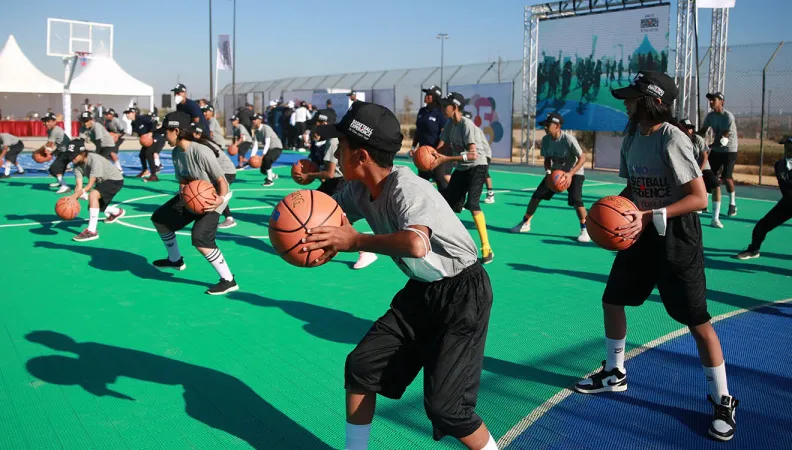Share the page
Africa's Sports Economy: A Window into a Rapidly Changing Continent
Published on

Since 2015, the role of sports in development has gained extensive international recognition. The UN 2030 Agenda has also recognized the potential of sports for development, and the role they can play in bringing about greater equality as well as achieving the Sustainable Development Goals (SDGs). In Africa, the sports economy, combined with the enormous potential of the continent’s athletes, could be a powerful factor in accelerating economic and social development.
With a population of 1.3 billion, Africa is the world’s youngest continent. By 2050, one young person in every three will be African. This unprecedented demographic factor means that for many young people in Africa, sports offer real hope, and are steadily emerging as a way to escape the marginalization of the most vulnerable in society. Sports can improve equality, in particular gender equality. However, they can also help to transform Africa in other ways, helping the continent to fulfil its Sustainable Development Goals (SDG).
The recent publication of the book “Africa's Sports Economy: Current Context, Challenges and Opportunities”, currently only available in French (Économie du sport en Afrique : réalités, défis et opportunités) reexamines this new and gradually emerging reality in Africa. Published by the African Sports & Creative Institute (ASCI), with the support of AFD, the work highlights the development potential offered by sports in Africa, as well as some of the ways in which African leaders could make sports a driver of sustainable growth. The book features contributions from the most prominent experts on sport and the African economy, as well as major African sports stars.
With a global growth rate of close to 5 % per annum over the past twenty years, the sports economy is thriving in Africa. Nevertheless, the economic benefits for the continent have not yet lived up to its enormous potential. Sport very rarely feature in development policies and lie outside the scope of public and private investors.
Encouraging investment in sport
For the development of the sports sector to serve as a real motor of economic growth, significant investment from both public authorities and private partners will be required. A paradigm shift is needed, firstly to expand and diversify the access of new participants and, secondly, to switch to a long-term investment approach. “More investment, less charity. This is what Africa wants,” says Masai Ujiri, the Nigerian President of the Toronto Raptors, an NBA basketball team, in a guest column for The Athletic.
The sports economy in Africa could benefit from a significant comparative advantage, namely the outstanding entrepreneurial fabric of a continent with the greatest number of entrepreneurs per capita in the world. However, without the necessary attention and suitable policy incentives, recent estimates show that sports still only represent 0.5 % of African GDP, compared to 2 % of GDP in other parts of the world.
Additional reading: AFD, the NBA and Basketball in Africa: Four Points on Sports and Development
Sports are funded both by the public sector and by individual donors. However, to develop the sector more fully, what it really needs is the involvement of private institutional investors. Over the last few years, this kind of investor has been expressing an increasing interest in the African sports economy, and we are now beginning to see that interest put into action.
The arrival of these new stakeholders is becoming clearer, as demonstrated by the bolstering of the NBA Africa in 2021. As has been the case in numerous development sectors in Africa, these initiatives will also fare better by working in partnership with public investors, which are able to guarantee the quality of investment.
Sport helping to achieve Sustainable Development Goals in Africa
By accompanying the continent’s high-speed transformation, spors have become a booming investment sector in Africa and are fueling new and particularly innovative types of cooperation, targeting the achievement of Sustainable Development Goals (SDG). Public development banks, headed by AFD Group, intend to fully support such initiatives.
A wide array of actors - including governments, international organizations, sports movements, associations, financial institutions, businesses and even athletes- will all play a role in this journey, with the shared objective of unleashing the economic and social potential of sports in Africa.
